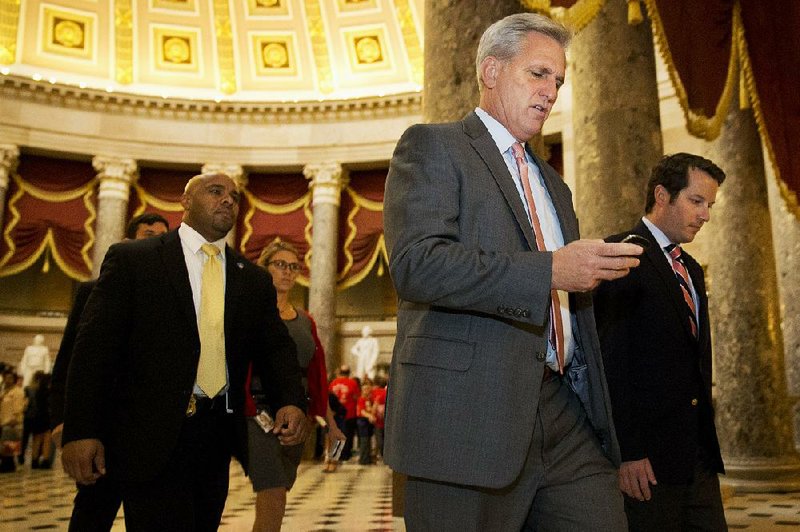WASHINGTON -- With hours to spare, Congress approved a stopgap spending bill Wednesday to keep the federal government open, at least until December.
Democrats helped House Republican leaders pass the measure by 277-151 after the Senate approved it by a 78-20 tally earlier in the day. President Barack Obama signed the bill Wednesday evening.
"The American people deserve far better than last-minute, short-term legislating," White House spokesman Josh Earnest said before Obama signed the bill, in pressing for a broader, longer-lasting budget deal.
The legislation finances the government through Dec. 11, providing 10 weeks to negotiate a more wide-ranging budget deal that would carry past the 2016 presidential election.
But House Speaker John Boehner is to resign from Congress at the end of October, a decision he announced last week after informing Republicans he would not risk a government shutdown over Planned Parenthood.
Approval of such stopgap measures used to be routine, but debate this year exposed divisions in the Republican Party. Lawmakers in the tea party wing had demanded that the stopgap spending measure be used to punish Planned Parenthood, stripping it of federal money because of its practice of supplying tissue from aborted fetuses for scientific research.
Tea party anger directed at Boehner over the Planned Parenthood issue helped prod the Ohio Republican's announcement to step down.
House Republicans, including Reps. Rick Crawford, French Hill and Bruce Westerman of Arkansas, made their opposition to the stopgap measure clear, but Democratic support was unanimous. Rep. Steve Womack was the only member of Arkansas' House delegation to vote in favor of the continuing resolution.
"Shutting down the government would not end funding for Planned Parenthood, it would only deny millions of federal and military employees the paychecks they need to support their families," Womack said in a statement. "Make no mistake, Planned Parenthood's actions are unethical and indefensible, and we must turn our attention to ensuring that its main federal funding -- mandatory spending -- is stopped once and for all."
A similar fight over implementing Obama's health care law sparked a 16-day shutdown two years ago that Boehner, Senate Majority Leader Mitch McConnell of Kentucky and other top Republicans did not want to repeat in election season. McConnell is seeking to protect GOP incumbents in Democratic-leaning states such as Wisconsin and Pennsylvania, while some GOP conservatives are seen as more apt to use the Planned Parenthood funding issue to appeal to the party's core voters on the right.
"Today was a win for the Washington cartel and another setback for the American people," said Sen. Ted Cruz, R-Texas, who is running for the Republican presidential nomination. "Republican leadership chose to abandon its constitutional power of the purse and to fund 100 percent of President Obama's failed agenda."
Support from Democrats also helped power the measure through the Senate, all of the opposition coming from conservative Republicans. Sens. John Boozman and Tom Cotton, both Republicans from Arkansas, voted against the measure.
Boozman said he thinks the Senate should have voted on the spending bills that Congress has spent months working on, his spokesman Patrick Creamer said.
"Senate appropriators worked very hard to ensure that these bills reflect the spending and policy priorities that are right for our nation. These 12 bills are what we should be voting on, not another continuing resolution," Creamer said.
Cotton said in a statement that the amount for defense in the resolutions is "wholly inadequate."
"Our military, suffering from years of neglect, has seen its relative strength decline to historic levels. Put simply, it's reached its breaking point as it attempts to respond to proliferating threats around the world from terrorist groups like ISIS. Congress must act now to stop the devastating cuts to our military and protect our national security," he said, using an acronym for the Islamic State extremist group.
Longtime lawmakers bemoaned the discord on Capitol Hill and the collapse of the annual appropriations process that is supposed to be wrapped up by now. Democrats demanding a new budget deal have blocked work in the Senate, while a fight over the Confederate flag halted work in the House with only six of the 12 annual spending bills having passed.
"It is to my great dismay that we are at this point again, requiring a temporary Band-Aid to buy us time to do our duty," said Rep. Hal Rogers, R-Ky., chairman of the Appropriations Committee, during House debate.
McConnell said Tuesday that he and Boehner spoke with Obama recently and that he expects budget negotiations to get underway soon. The turmoil in the House, where many conservatives want to block spending increases, is seen as a hurdle for the talks, which are said likely to focus on swapping near-term budget increases for the Pentagon and domestic programs for longer-term saving elsewhere in the budget.
Majority Leader Kevin McCarthy, R-Calif., the likely new House speaker, hasn't said whether he supports a deal.
The Pentagon and domestic agencies all are still operating under automatic curbs that would effectively freeze their spending at current levels. Republicans are leading the drive to boost defense while Obama is demanding equal relief for domestic programs.
The conversation among McConnell, Boehner and Obama took place in mid-September -- before Boehner announced he was stepping down. Many of the conservative GOP lawmakers who helped bring Boehner down want to preserve stringent caps on the spending bills Congress passes every year. But Senate Republicans are generally more eager to rework the 2011 Budget Control Act that put them in place.
"We have to stop devastating sequester cuts from hitting our military and middle class, even the Republican leader agrees," said top Senate Democrat Harry Reid of Nevada. "Because a week or 10 days ago he said, 'We are inevitably going to end up in negotiations that that will crack the Budget Control Act once again. I say, 'Hallelujah.'"
Eight of the 20 Republican senators who opposed Wednesday's bill are up for re-election in states carried by Mitt Romney in 2012. Presidential aspirants Sens. Lindsey Graham of South Carolina and Marco Rubio of Florida skipped the vote.
Republicans have long targeted Planned Parenthood, and the group's top official defended it Tuesday in congressional testimony.
Republicans say videos made by abortion foes show Planned Parenthood has broken federal laws including a ban on for-profit fetal tissue sales. The organization says it has acted legally and the videos were deceptively edited.
Information for this article was contributed by Andrew Taylor of The Associated Press and by Sarah D. Wire of the Arkansas Democrat-Gazette.
A Section on 10/01/2015


